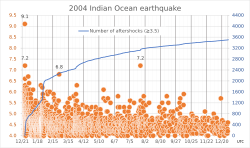2004 Indian Ocean earthquake and tsunami
The 2004 Indian Ocean earthquake and tsunami, also called the Sumatra-Andaman earthquake (known by the scientific community), was a great underwater earthquake. It happened at 00:58:53 UTC (07:58:53 local time) December 26, 2004.
| 240px | |
| Village near the coast of Sumatra | |
| Date | {{{date}}} |
|---|---|
| Duration | 10 minutes |
| Magnitude | 9.1–9.3 Mw |
| Depth | 30 km (19 mi) |
| Epicenter location | 3°18′58″N 95°51′14″E / 3.316°N 95.854°ECoordinates: 3°18′58″N 95°51′14″E / 3.316°N 95.854°E |
| Type | Megathrust |
| Countries or regions affected | {{{countries affected}}} |
| Total damage | US$15 billion[1] |
| Max. intensity | IX (Violent) |
| Tsunami | |
| Casualties | 227,898 dead[4][5][6] |
The epicenter of the earthquake was off the west coast of Sumatra, Indonesia. At first, the earthquake was measured as a 9.0 on the Richter scale. It was the longest ever recorded ocean earthquake. It lasted between 500 (8.3 minutes) and 600 (10 minutes) seconds. It was so powerful that it caused the entire Earth to vibrate. It started other earthquakes as far away as Iceland.
The Asian tsunami
The large movement of earth under the water caused a very large and powerful tsunami. The tsunami was called the Asian tsunami, or the Boxing Day tsunami in Australia, Canada, England, and South Africa because it happened on the 26th of December 2004 (Boxing Day). It spread all over the Indian Ocean. The tsunami caused heavy damage to countries such as Malaysia, Thailand, Indonesia and Sri Lanka. It also devastated the eastern coast of India, such as the states of Tamil Nadu, Orissa and Andhra Pradesh.
Waves as high as 30m (100ft) killed many people and damaged or destroyed a lot of buildings and other property. Over 225,000 people died or were not found after the tsunami. The wave did damage in East Africa as far away as South Africa (8000km/ 5000mi) where as many as 8 people died because of high water caused by the wave. Because of how much damage was caused and the number of people the earthquake affected, over $7 billion (USD) was donated to help rebuild the areas damaged. This was extremely helpful in rebuilding their respective economies.
UN Secretary-General Kofi Annan, US Secretary of State Colin Powell, Sultan Hassanal Bolkiah of Brunei, former Malaysian Prime Minister Mahathir Mohamad, and Australian Prime Minister John Howard all visited Aceh to see the disaster aftermath.[7]
2004 Indian Ocean Earthquake And TsunamiThe Asian Tsunami Media
Tsunami washing ashore in Ao Nang, Thailand
Vertical-component ground motions recorded by the Global Seismographic Network and displayed by the IRIS Consortium
Seismic moment release of the largest earthquakes from 1906 to 2005
The tsunami's propagation took 5 hours to reach Western Australia, 7 hours to reach the Arabian Peninsula, and did not reach the South African coast until nearly 11 hours after the earthquake
Average height of the waves
Maximum recession of tsunami waters at Kata Noi Beach at 10:25 a.m., prior to the third—and strongest—tsunami wave
Tsunami wave field in the Bay of Bengal an hour after the earthquake
Other websites
| Wikimedia Commons has media related to Lua error in Module:Commons_link at line 62: attempt to index field 'wikibase' (a nil value).. |
| Wikinews has : |
News collections
- BBC News - In-Depth Report: Tsunami Disaster
- Channel News Asia - One Year On, Memorial & Updates to the Asian Tsunami Disaster
- CNN - Tsunami, One Year After Archived 2008-09-24 at the Wayback Machine
- Guardian Unlimited - Special Report: Indian Ocean Tsunami Disaster
- New York Times
- Sydney Morning Herald - Waves of Devastation Archived 2008-10-12 at the Wayback Machine
Photos and video
- Yahoo! Slideshows — Asian Tsunami Disaster
- Satellite images of tsunami-affected areas (National University of Singapore)
- Tsunamis.com - 2004 Asian Tsunami Pictures
- After the Tsunami Danish writer and photographer Thorsten Overgaard's documentary on the relief work after the December 26, 2004 tsunami.
References
- ↑ "Indian Ocean Tsunami – Economic Aspects". indianoceantsunami.web.unc.edu. Archived from the original on 2019-04-18. Retrieved 2019-04-18.
- ↑ "Astonishing Wave Heights Among the Findings of an International Tsunami Survey Team on Sumatra". U.S. Geological Survey. Archived from the original on 27 August 2016. Retrieved 16 June 2016.
- ↑ Lua error in Module:Citation/CS1/Identifiers at line 630: attempt to index field 'known_free_doi_registrants_t' (a nil value).
- ↑ "Joint evaluation of the international response to the Indian Ocean tsunami: Synthesis Report" (PDF). TEC. July 2006. Archived from the original (PDF) on 2006-08-25. Retrieved 9 July 2018.
- ↑ "Earthquakes with 50,000 or More Deaths". U.S. Geological Survey. Archived from the original on 5 June 2013.
- ↑ "Indian Ocean tsunami anniversary: Memorial events held". BBC News. 26 December 2014. Retrieved 15 December 2016.
- ↑ "Australian PM sees ravaged Aceh" (in en). BBC News. 2005-02-02. http://news.bbc.co.uk/2/hi/asia-pacific/4228799.stm.



